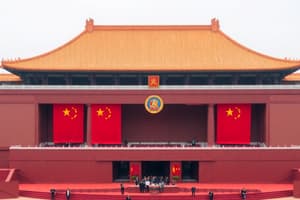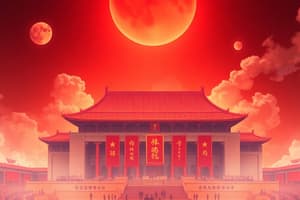Podcast
Questions and Answers
What is the primary function of the National People’s Congress (NPC)?
What is the primary function of the National People’s Congress (NPC)?
- To supervise the judicial organs of the state
- To serve as the highest organ of state power (correct)
- To exercise functions and powers when in session
- To elect the President of the People’s Republic of China
How are deputies to the National People’s Congress chosen?
How are deputies to the National People’s Congress chosen?
- Selected by the Communist Party of China
- Appointed by the President of the PRC
- Elected from various regions through indirect elections (correct)
- Elected by the National Congress directly
What is the term of office for the President of the People’s Republic of China?
What is the term of office for the President of the People’s Republic of China?
- Four years
- Six years
- Indefinite
- Five years (correct)
Which body acts as the highest judicial organ in China?
Which body acts as the highest judicial organ in China?
What year was the Communist Party of China (CPC) founded?
What year was the Communist Party of China (CPC) founded?
What is the frequency of the National Congress of the Communist Party of China?
What is the frequency of the National Congress of the Communist Party of China?
What is the role of the Central Committee of the CPC?
What is the role of the Central Committee of the CPC?
Which of the following is NOT a power of the Supreme People’s Court?
Which of the following is NOT a power of the Supreme People’s Court?
Which entity has the authority to amend the Constitution and oversee its enforcement?
Which entity has the authority to amend the Constitution and oversee its enforcement?
What function is NOT performed by the Supreme People's Court?
What function is NOT performed by the Supreme People's Court?
Which of the following is incorrect regarding the organisational principles of the Communist Party of China?
Which of the following is incorrect regarding the organisational principles of the Communist Party of China?
Which of the following parties exists as a democratic party in China?
Which of the following parties exists as a democratic party in China?
Which statement about the CPPCC is true?
Which statement about the CPPCC is true?
What is excluded from the sectors represented in the CPPCC?
What is excluded from the sectors represented in the CPPCC?
Which of the following best describes the duties of the NPC?
Which of the following best describes the duties of the NPC?
Which option correctly outlines aspects of the National People's Congress?
Which option correctly outlines aspects of the National People's Congress?
What is a primary function of the National People’s Congress (NPC) that is not shared with the Hong Kong Legislative Council (LegCo)?
What is a primary function of the National People’s Congress (NPC) that is not shared with the Hong Kong Legislative Council (LegCo)?
How does the Legislative Council of Hong Kong differ from the National People’s Congress in terms of overseeing the judiciary?
How does the Legislative Council of Hong Kong differ from the National People’s Congress in terms of overseeing the judiciary?
What is one of the primary functions of the Chinese People's Political Consultative Conference (CPPCC)?
What is one of the primary functions of the Chinese People's Political Consultative Conference (CPPCC)?
Which of the following statements best describes the power relationship between the Chief Executive of Hong Kong and the National People’s Congress?
Which of the following statements best describes the power relationship between the Chief Executive of Hong Kong and the National People’s Congress?
Which channel is considered effective for citizens to supervise the government's work?
Which channel is considered effective for citizens to supervise the government's work?
What aspect of government work can the CPPCC criticize as part of its democratic supervision function?
What aspect of government work can the CPPCC criticize as part of its democratic supervision function?
Which of the following roles does the National People’s Congress have that the Legislative Council does not?
Which of the following roles does the National People’s Congress have that the Legislative Council does not?
What is NOT a function of the Chinese People's Political Consultative Conference (CPPCC)?
What is NOT a function of the Chinese People's Political Consultative Conference (CPPCC)?
What is the core function of the Political Bureau of the CPC when not in session?
What is the core function of the Political Bureau of the CPC when not in session?
How many members are there in the Standing Committee of the Political Bureau?
How many members are there in the Standing Committee of the Political Bureau?
What is one of the primary roles of the Central Commission for Discipline Inspection?
What is one of the primary roles of the Central Commission for Discipline Inspection?
Which of the following is NOT a major function of the Chinese People’s Political Consultative Conference (CPPCC)?
Which of the following is NOT a major function of the Chinese People’s Political Consultative Conference (CPPCC)?
What term of office does the Chinese People’s Political Consultative Conference (CPPCC) operate under?
What term of office does the Chinese People’s Political Consultative Conference (CPPCC) operate under?
What is the primary focus of the anti-corruption work promoted by the Central Commission for Discipline Inspection?
What is the primary focus of the anti-corruption work promoted by the Central Commission for Discipline Inspection?
Which state position does Xi Jinping hold according to the provided information?
Which state position does Xi Jinping hold according to the provided information?
What is the role of the CPPCC regarding state affairs?
What is the role of the CPPCC regarding state affairs?
Flashcards
National People's Congress (NPC)
National People's Congress (NPC)
Highest organ of state power in China, elected indirectly by the people.
President of China
President of China
The head of state, elected by the National People's Congress for a 5-year term.
State Council
State Council
China's executive body, responsible for implementing laws and policies of the government.
People's Courts
People's Courts
Signup and view all the flashcards
Communist Party of China (CPC)
Communist Party of China (CPC)
Signup and view all the flashcards
National Congress (CPC)
National Congress (CPC)
Signup and view all the flashcards
Central Committee (CPC)
Central Committee (CPC)
Signup and view all the flashcards
Term of Office (NPC/President)
Term of Office (NPC/President)
Signup and view all the flashcards
Political Bureau & Standing Committee
Political Bureau & Standing Committee
Signup and view all the flashcards
Central Commission for Discipline Inspection
Central Commission for Discipline Inspection
Signup and view all the flashcards
CPPCC
CPPCC
Signup and view all the flashcards
CPPCC Functions (Political Consultation)
CPPCC Functions (Political Consultation)
Signup and view all the flashcards
CPPCC Functions (Democratic Supervision)
CPPCC Functions (Democratic Supervision)
Signup and view all the flashcards
Xi Jinping's Position
Xi Jinping's Position
Signup and view all the flashcards
Li Qiang's Position
Li Qiang's Position
Signup and view all the flashcards
Zhao Leji's Position
Zhao Leji's Position
Signup and view all the flashcards
NPC Duties
NPC Duties
Signup and view all the flashcards
Supreme People's Court Function
Supreme People's Court Function
Signup and view all the flashcards
CPC Organizing Principle
CPC Organizing Principle
Signup and view all the flashcards
Democratic Party in China
Democratic Party in China
Signup and view all the flashcards
CPPCC Sessions
CPPCC Sessions
Signup and view all the flashcards
CPPCC Membership
CPPCC Membership
Signup and view all the flashcards
CPC's Democratic Centralism
CPC's Democratic Centralism
Signup and view all the flashcards
NPC Role
NPC Role
Signup and view all the flashcards
NPC vs. LegCo: Similarities
NPC vs. LegCo: Similarities
Signup and view all the flashcards
NPC vs. LegCo: Difference (Constitution)
NPC vs. LegCo: Difference (Constitution)
Signup and view all the flashcards
NPC vs. LegCo: Difference (Judiciary)
NPC vs. LegCo: Difference (Judiciary)
Signup and view all the flashcards
NPC vs. LegCo: Difference (Leadership)
NPC vs. LegCo: Difference (Leadership)
Signup and view all the flashcards
CPPCC: Political Consultation
CPPCC: Political Consultation
Signup and view all the flashcards
CPPCC: Democratic Supervision
CPPCC: Democratic Supervision
Signup and view all the flashcards
CPPCC: Participation
CPPCC: Participation
Signup and view all the flashcards
People's Supervision: Internet
People's Supervision: Internet
Signup and view all the flashcards
Study Notes
Chinese Political System
-
National People's Congress (NPC): Highest organ of state power
- Term of office: 5 years
- Deputies elected from provinces, autonomous regions, municipalities, army and special administrative regions (indirect election).
- Delegation quota based on population ratios.
- Standing Committee exercises NPC functions when not in session.
-
President:
- Xi Jinping (current)
- Elected by the National People's Congress
- Term of office: 5 years
-
State Council (Central People's Government):
- Executive body of the highest organ of state power
- Highest organ of state administration
- Term of office: 5 years
-
Judicial Organs:
- People's Courts: Highest judicial organ is the Supreme People's Court.
- Examines and approves death penalty cases
- Provides judicial interpretation on laws
- People's Procuratorates: State organs for legal supervision
- People's Courts: Highest judicial organ is the Supreme People's Court.
Communist Party of China (CPC)
- Founded in 1921
- Implements decisions from top to bottom
- Principle: Four subordinates under democratic centralism
- National Congress: Top leadership organ, held every five years
- Central Committee: Carries out decisions of the National Congress when not in session
- Political Bureau and Standing Committee: Core power when the Central Committee is not in session
- Central Military Commission: Key element of party power
- Control over discipline and anti-corruption work
- Punishing members who commit corruption
Chinese People's Political Consultative Conference (CPPCC)
- Set up by the CPC to unite people across the country
- Practices multi-party cooperation and political consultation
- Term of office: 5 years
- Major functions: Political consultation (pre-decisional consultations on national and local principles and important issues), Democratic supervision (making proposals and criticisms of state organs' work), and Participation in and deliberation of state affairs.
Studying That Suits You
Use AI to generate personalized quizzes and flashcards to suit your learning preferences.



